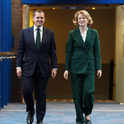Probably not even Nigel Farage’s closest friends would claim that a grasp of detail is his most salient characteristic. In tweeting this morning that Louise Casey’s review into opportunity and integration was “excellent” and “much of what I have been saying for years,” Farage may have been judging the report without the benefit of reading it.
I have read the report, however. It is indeed the type of document that would appeal to a politician who blames traffic jams on immigrants and expresses discomfort when hearing foreign languages on public transport. It warns that segregation and social exclusion are at “worrying” levels, and it does so—extraordinarily—without indicating what it would accept as countervailing evidence.
The Casey review is a vapid and ill-conceived intervention by a public servant with a record of superficial statements. In her review "Engaging Communities in Fighting Crime" (2008), for example, Casey stirringly declared that "the public are not daft. They know what’s wrong, they know what’s right, and they know what they want on crime and justice." The idea that the public should be informed by a review rather than dictate what's in it apparently didn't occur to her. Casey's venture into community relations is additionally mischievous as it insinuates into public debate the notion that responsibility and blame for a lack of integration lie with minority communities—especially with British Muslims.
To attack the Casey review will inevitably draw accusations of complacency or (tell me about it) being in a metropolitan media bubble. But Casey herself cites a finding that ought to dominate the discussion of integration: “In 2015-16, 89 per cent of people thought their community was cohesive, agreeing that their local area is a place where people from different backgrounds get on well together. This feeling of cohesiveness has risen slowly from 80 per cent in 2003.”
That’s a good thing and a substantial improvement. It’s 15 years since urban riots in Oldham, Burnley and Bradford caused fears of ethnic segregation in British towns. An official report concluded that communities were living “parallel lives.” Yet things have been getting better. Meanwhile, patterns of ethnic concentration ebb and flow: you’d expect this, as communities become settled and then disperse. What matters is the aggregate picture. And figures from the last three censuses (the most recent being in 2011) do not support the contention that ethnic segregation is increasing in the UK.
Certainly, more recent arrivals in Britain tend to be more concentrated. Bangladeshis are more segregated than other populations from south Asia. In my part of London, Bengali (a major language spoken by 220 million people worldwide) is what you customarily hear in shops or on buses. I’d be very surprised if it were as dominant in 30 years’ time. On current trends Yiddish is likely to be a very widely spoken language in the same area.
Is this worrying? Again Casey undercuts any such notion by acknowledging that “research examined during the review suggests that concentrations of ethnic communities can have both positive and negative effects, and that outcomes do not appear to be uniform for all groups.” Well, blow me down.
The interest of the state in the ethnic, creedal and linguistic composition of its citizens should be exactly none. Its sole concern is common citizenship under the rule of law. This ought to be axiomatic. The state no longer confines civic office to communicant members of the Church of England, for example; if you’re worried about community cohesion, why not insist (as Edmund Burke, the patron saint of modern conservatism did) that Britain be a Christian commonwealth? The answer is that it’s incompatible with the principle of a free society where citizens choose the good for themselves and live as they wish.
The Casey review manages to be simultaneously turbid and shallow. It consistently confuses the issues of segregation and susceptibility to extremism. Facile remarks litter the report, especially in this area: “There is much to learn, share and analyse in issues faced and approaches being taken.” In parts, it reads like a rather desperate last-minute essay: “There is strong evidence in overseas contexts that the drivers of extremism correlate to political and social exclusion and marginalisation.” Or perhaps the problem of extremism isn’t reducible to sweeping bromides like this: the 7/7 terrorists were, after all, formally well integrated into British society and didn’t lack fluency in English.
The most culpable aspect of the Casey review is that it lacks rigour and continually appeals to “feelings” rather than facts. Immigration has become a high-profile issue in public debate but that doesn’t mean that all claims about its effects are justified. The economic impact of immigration is broadly beneficial though with some small negative effect on the lower end of the income distribution. This unspectacular but evidence-based conclusion doesn’t lend weight to Casey’s concerns so she is driven to nebulous judgments such as that “it is understandable that the pace and scale of immigration has felt too much for some communities.”
Well, are they right or wrong? I know Farage’s answer and the intellectual standards he employs in reaching it; and he can surely discern the comforting message that Casey provides him with.
I state my reservations about the Casey review and about the competence of Casey herself as dispassionately as I can but one message from her review is especially insidious. She criticises public institutions that “have ignored or even condoned regressive, divisive and harmful cultural and religious practices, for fear of being branded racist or Islamophobic.” She rightly refers to the Rotherham child abuse scandal as “a catastrophic example of authorities turning a blind eye to harm in order to avoid the need to confront a particular community.”
As it happens, it was my newspaper and my colleague Andrew Norfolk who exposed the horrific sexual exploitation of children in Rotherham. And the scandal is bigger still than Casey allows for. Jayne Senior, the youth worker who approached The Times to expose the abuse, identifies an institutional failing with the police, who “did nothing and Senior believes underlying their inertia was disgust for the girls. They were ‘dirty little slags, the worst type since they’d ‘even go with Pakis’ and had brought it on themselves” (profile of “The Rotherham Whistleblower,” Times magazine, 19th March 2016).
You get the feeling—or at least I do—from Casey’s report that she is seeking an off-the-shelf example of purported political correctness without fully grasping the scale and scandal of what she’s dealing with. But it serves to place the moral onus on ethnic minorities for supposed failures of integration. That’s a shabby thing to do, in a document that bears more resemblance to a long and unsubstantiated opinion column than a serious review of the state of Britain.

General view of Shepherd's Bush market in west London ©Matt Crossick/Matt Crossick/Empics Entertainment
The Casey Review is an ill-conceived intervention
The report on “opportunity and integration” lacks rigour
December 5, 2016











